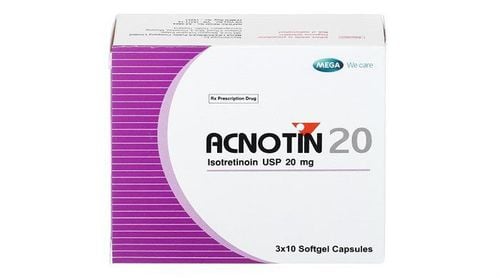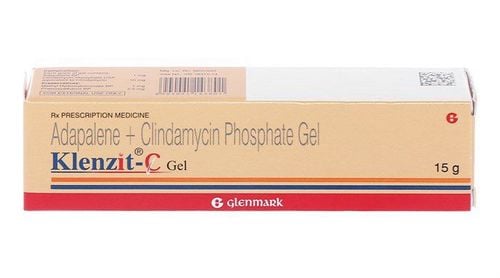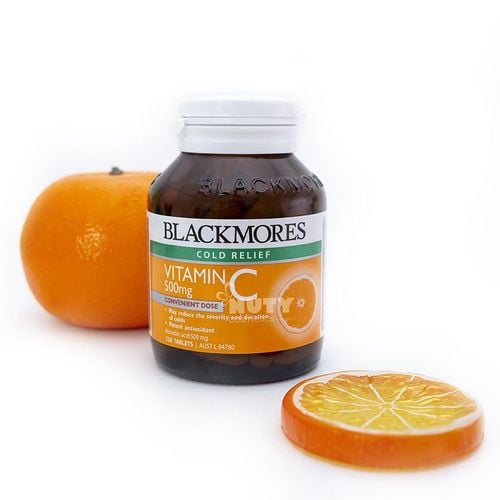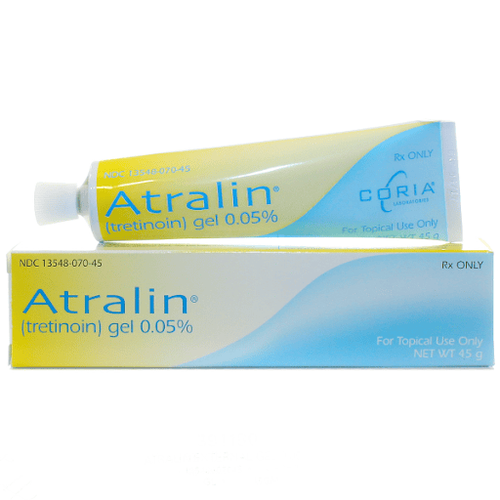This is an automatically translated article.
Tretinoin is a derivative of Vitamin A with many different uses when applied topically. This active ingredient is found in Dermaderm products. So what is Dermaderm and in what cases is it used?
1. What is Dermaderm?
Dermaderm's ingredients include:
Main active ingredients: Tretinoin 0.05% concentration; Excipients are just enough like Paraffin, Propylene glycol, Methylparaben, Propylparaben, Luvigel, Polawax, Macrogol cetostearyl ether, dl-alpha tocopheryl acetate, acetic acid, Butylated hydroxytoluene and purified water. Dermaderm products are prepared in the form of a topical cream, packed in each box of 10g, 15g, 25g or 30g cream. Dermaderm topical cream is manufactured by AMPHARCO U.S.A Pharmaceutical Joint Stock Company. The active ingredient Tretinoin in Dermaderm is essentially a derivative of Vitamin A, when used in the form of a topical cream, it will have the effect of treating acne and combating the appearance of photo-aging skin. Note that the topical effects of the active ingredient Tretinoin in Dermaderm are not related to the physiological effects of Vitamin A.
When using Dermaderm cream, Tretinoin will have many different effects on skin cells, including stimulating cell division and promoting the renewal of epidermal cells, inhibiting Keratin formation and stimulating connective tissue regeneration. In addition, active ingredient Tretinoin also has the ability to prevent and even shrink tumors caused by some cancer-causing agents. In dermatology, the active ingredients Tretinoin has been used to treat acne, psoriasis, ichthyosis, and actinic keratosis. With acne, active ingredient Tretinoin acts directly on cell lysosomes, thereby stimulating the release of proteolytic and hydrolytic enzymes.
These effects of Tretinoin are associated with an inflammatory response that sheds squamous cells, which are the cells responsible for the primary damage of acne by clogging the follicles. The removal of these "nodes" by Tretinoin will cause the acne kernels to be released, the microcapsules (containing many Staphylococcus Epidermis and Propionibacterium acnes bacteria) will be enlarged and sebum stasis will be avoided.
2. Indications and contraindications of Dermaderm
Dermaderm skin cream with Tretinoin as the main ingredient is used in the following cases:
Treatment of mild to moderate acne; Treats skin aging conditions caused by long-term sun exposure, including wrinkles, dark spots, and rough patches on the face. However, patients will be contraindicated to use Dermaderm if they have the following problems:
Hypersensitivity or allergy to active ingredient Tretinoin or any other excipients in the drug; Skin is sunburned.
3. Dosage and how to use Dermaderm
Dermaderm products are for external use only. Patients should apply Dermaderm cream once daily in the evening with a sufficient amount to cover the affected skin. Note: Before using Dermaderm, the patient should wash the affected area with mild soap, then gently pat the skin dry and wait for about 20-30 minutes before applying Dermaderm.
Patients need to wash their hands thoroughly immediately after using Dermaderm and must use caution, avoid getting Dermaderm in eyes, ears, nose and mouth.
After using Dermaderm , the area where the medicine is applied may feel warm or transient. In case of intolerance to the daily application of Dermaderm, the frequency of use can be reduced. Conversely, when the patient has a response to Dermaderm, continue treatment and gradually increase the number of times of application.
For acne, the therapeutic effects of Dermaderm usually appear after 2-3 weeks of application and optimal effect can be achieved up to 6 weeks. After maximal results are achieved, patients can move on to maintenance treatment by reducing the number of Dermaderm applications.
For photo-aging skin conditions, the response to Dermaderm treatment will gradually increase after 6 months of application and it will take at least 8 weeks to notice a reduction in fine lines. After achieving maximum results, patients can be maintained on Dermaderm by applying the drug 2-4 times per week.
Treating an overdose of Dermaderm :
Using an overdose of the active ingredient Tretinoin on the skin will not effectively improve the symptoms, but on the contrary can lead to more skin irritation such as redness, peeling and itching. ; In case of overdose of Dermaderm, the doctor will prescribe symptomatic treatment.
3. Dermaderm side effects
Common adverse effects of topical Tretinoin are mainly local inflammatory reactions similar to sunburn and will disappear when Dermaderm is discontinued.
Common adverse reactions when applying Dermaderm cream include:
Skin: Dry skin, erythema, scaling, hyperpigmentation or hypopigmentation, photosensitivity, peeling or initial acne flare ; Local: A stinging, stinging, burning sensation or the formation of blisters; Cardiovascular: Edema.
5. Dermaderm Drug Interactions
Care should be taken when co-administering Dermaderm with other topical medications, medicated or corrosive soaps, shampoos, cosmetics, strong drying cleansers, products with high alcohol content. , astringents, additives, depilatories or waxes and products that may cause skin irritation due to the increased risk of irritation with Tretinoin .
Do not use Dermaderm if the patient is taking drugs that can make the skin more sensitive to light such as Thiazide diuretics, Tetracycline antibiotics or Fluoroquinolones, Phenothiazines, Sulfonamides, because the skin has an increased risk of irritation to light.
6. Be careful when using Dermaderm
The specialist should carefully instruct the patient on the use of Dermaderm and the associated precautions. Patients should be tested for sensitization to Dermaderm prior to treatment by applying the drug several times to a small area of the lesion. Even with normal skin, tretinoin can still cause a mild inflammatory reaction, leading to thickening of the spinous and parakeratoid layers. Excessive application of Dermaderm does not increase the therapeutic effect and can lead to adverse reactions such as redness, peeling and discomfort. In particular, some preparations with a high concentration of active ingredient Tretinoin can also cause severe damage to the skin's epidermis and produce blisters. Patients treated with Dermaderm on the face should not wash their face more than 2-3 times per day, and only use mild and neutral soaps. It is important not to apply Dermaderm to the eyes and around the eyes, mouth, corners of the nose, mucous membranes or open wounds. During treatment with Dermaderm, patients should avoid sun exposure as much as possible and do not expose to ultraviolet rays. Dermaderm should not be used with caution in patients with eczema. Although studies have shown that topical tretinoin does not increase the risk of birth defects, caution must be exercised when using Dermaderm in pregnant women due to the risk of adverse effects on the fetus. . In particular, do not use Dermaderm for this subject to treat wrinkles, pigmentation or horns on the face. It is not known whether tretinoin is excreted in breast milk when topically treated with Dermaderm. Experts recommend extreme caution when administering Tretinoin to nursing mothers. Dermaderm drug with the main ingredient is Tretinoin is indicated for the treatment of acne, skin aging. To ensure the effectiveness of treatment and avoid unwanted side effects, patients need to strictly follow the instructions of the doctor, professional pharmacist.
Follow Vinmec International General Hospital website to get more health, nutrition and beauty information to protect the health of yourself and your loved ones in your family.













